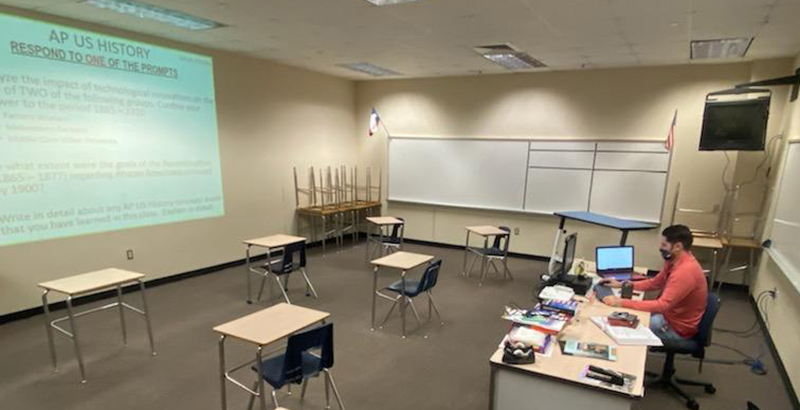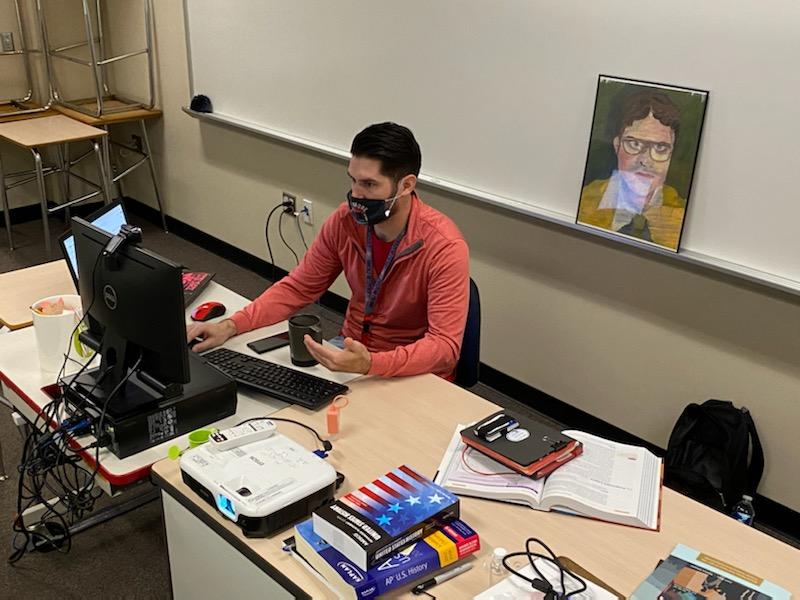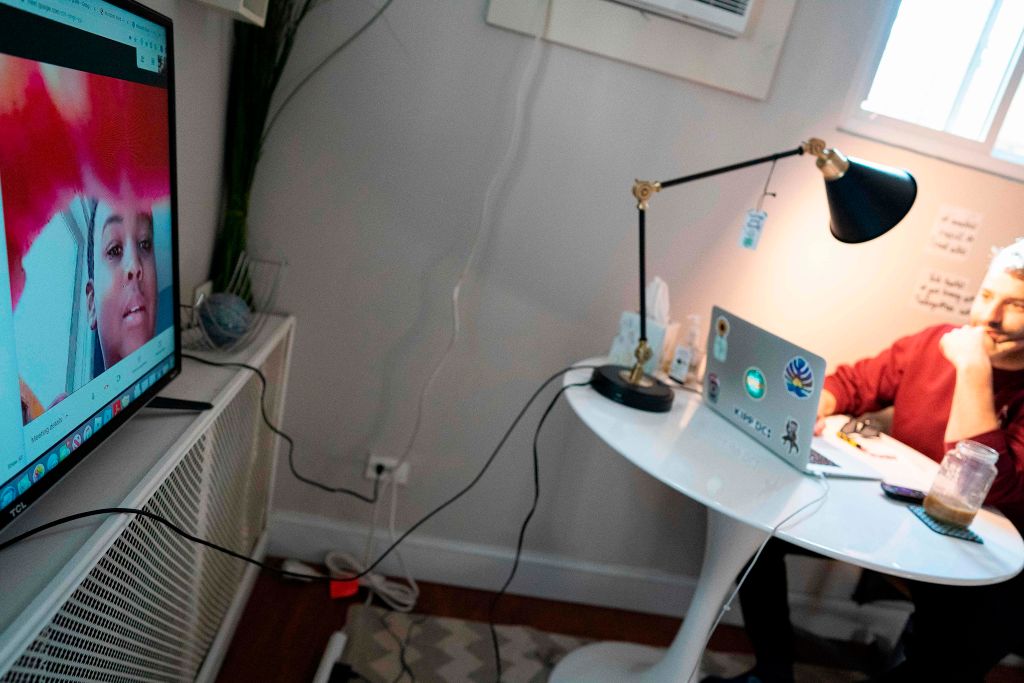‘Teacher Cams’ Could Revolutionize Education After the Pandemic Ends, But Some Critics See a Massive Student Privacy Risk

Updated March 5
On any given school day, just one or two students show up in-person for Houston teacher Trevor Toteve’s lectures. With the bulk of his class opting to learn remotely during the pandemic, several beam themselves into the classroom via webcam.
But most students appear as static, black boxes.
Toteve urges the high schoolers in his AP U.S. History class to turn on their cameras as they work remotely, a makeshift strategy that’s allowed students across the country to connect face-to-face with their teachers and peers during the year-long pandemic. Yet when given the choice, most of his students keep them turned off.
“I try to encourage it, like, ‘Hey, it’s going to be better for you guys if you do this,’ but there’s so many reasons why they don’t,” such as spotty internet, Toteve said. Students’ home lives have also gotten in the way, he found. Some live in multigenerational households without a quiet spot to learn or are experiencing homelessness. Others work simultaneously at fast food joints. These realities, he said, are the “biggest reason why I don’t force it.”
Over the last year, students in many districts have been required to use webcams to learn remotely, allowing a little piece of normalcy during a school year that’s been anything but. The practice, some argue, creates a sense of cohesion at a time of widespread isolation and allows teachers to ensure students are paying attention. For Toteve, convincing students to engage with lessons is especially challenging when their cameras are off, he said.
Some see cameras as a long-overdue innovation in education, potentially allowing students to continue to connect with their teachers and classmates remotely well after the pandemic subsides. Numerous district leaders have already talked about keeping some measure of remote learning in place well into the future for students who are unable to attend classes in-person or are more efficient learners at home. Yet some critics see cameras in classrooms as a student privacy nightmare. In some instances, school webcam mandates could violate the Constitution, student privacy experts said.
Nationally, about three-quarters of educators require students to use webcams if their district offers live remote instruction during the pandemic, according to a recent survey by the Education Week Research Center. While 42 percent of educators said they allow for exceptions, nearly two-thirds said students could face consequences if they turn off their cameras during class. School camera policies are stricter in districts where students of color make up the majority versus those where most students are white, researchers found.
About a third of parents said they would like their children to attend school remotely indefinitely, according to a new NPR/Ipsos poll.
Attorney Amelia Vance, director of youth and education privacy at the Future of Privacy Forum, maintained that school webcam mandates could violate the Fourth Amendment, which prohibits unreasonable government searches.
“It’s really difficult to argue that this doesn’t constitute some level of invasion of privacy,” Vance told The 74. Such a contention is especially astute when educators discipline students for behaviors in their own homes. “If there are things that students are being punished for, then I think it is likely that courts would rule that it’s a search under the Fourth Amendment and would start to look at whether or not it was reasonable.”
Such situations are already unfolding in courtrooms. In one high-profile case, a 9-year-old boy was suspended from his Louisiana school last fall after a teacher reportedly observed a BB gun in his bedroom during remote class. The child’s parents and attorney say he was moving the BB gun out of his little brother’s path and that he didn’t make any threatening remarks. His attorney argued in a federal lawsuit that the ordeal violated the family’s right to privacy.
Vance said that such cases are likely rare because most educators understand the pandemic is unprecedented and have offered students a degree of flexibility. But that’s beginning to change as COVID-19 drags on, she said.
“There is this push to go back to the quote-unquote normal, which also involves going back to more discipline,” she said.
It’s unclear how such situations could play out in court, she said, pointing to a dizzying web of case law that makes the legality of school webcam rules far from clear-cut. Courts have long given schools latitude to surveil, search and discipline students, she said, but they’ve also been increasingly restrictive on the government’s access to personal technology. Also at play is well-established court precedent that protects people from government snooping inside their own homes.
“The home is the man’s castle,” she said. “It’s the place where [people] should have privacy and solitude to be able to create thoughts and beliefs without everyone watching.”

A window into students’ lives
Webcams have given teachers an unprecedented, wide-open window into the lives of their students. Toteve, the Houston teacher, said some students have logged into his morning classes from their beds, still wrapped in blankets with the lights off. As the pandemic compounded economic hardships for some families, his students have logged on while caring for younger siblings.
Other teachers have observed students learning from the parking lots of fast food restaurants and from closets where they found the internet was the most reliable. For one educator, who teaches kindergarten in Maryland, the situation has been eye-opening. Some of her students have home learning environments kept tidy by house cleaners, while others learn in rooms that are sparsely furnished. Seeing into students’ lives made her more empathetic toward those who are struggling, she said.
Cameras have also given her a new opportunity to ensure her students are safe, including in a situation of apparent parental abuse, said the teacher, who spoke on the condition of anonymity because she wasn’t authorized to discuss the situation. When a 5-year-old boy was having trouble staying in his seat during virtual instruction, she observed his father “strongarm” him back in front of the camera.
“The dad is a big, big, big man and this little boy is a little skinny thing,” she said. It was the student’s comments that ultimately led the teacher to report his father to child protective services — though she remains uncertain about whether anybody took action against him. She asked the students at the start of a school day how they were feeling. The boy said he was angry because his father had been hitting him. In many states, including Maryland, teachers are “mandatory reporters” charged with notifying authorities if they have reason to believe a child is being abused. But it was the webcam that helped this teacher recognize the severity of the situation.
“I would not have known that had we been in the classroom and not been virtual.” she said. “I would not have known how dad picks up his kid.”
Even before the pandemic shuttered campuses, some advocates demanded cameras in classrooms to hold educators accountable for child abuse and ineffective teaching practices. In 2006, a Texas middle school student with a significant cognitive disability returned home from school with injuries on multiple occasions. The family sued after a school employee reported that the student’s teacher hit him, yelled at him aggressively and even ate part of his lunch.
The situation resulted in a $1 million court verdict and prompted a Texas law that requires districts to equip some classrooms with cameras if a parent requests them — a policy that divided many in the special education community.
Children with disabilities have long been subjected to discipline at disproportionate rates compared to their nondisabled peers, a reality that could be perpetuated by school camera mandates during the pandemic, Meghan Whittaker, director of policy and advocacy at the National Center for Learning Disabilities, said during a webinar last week.
“We’ve heard of situations where teachers don’t like how a student is participating in class or how they’re acting on camera and those students are kicked out of the virtual classroom,” she said. “Virtual education lends itself to a whole new form of exclusionary discipline that we need to be mindful of,” especially as it relates to children with special needs.
Holding teachers accountable
Most school buildings are currently equipped with surveillance cameras in places like entrances and hallways — a reality that was motivated in part by mass school shootings. But groups like the National Education Association have for years opposed cameras inside classrooms, a practice that the nation’s largest teachers union has compared to a dystopian “Big Brother.” Michael Petrilli, president of the Thomas B. Fordham Institute, a center-right education think tank, has long argued that such “teacher cams” could be beneficial in classrooms to evaluate educators and hold them accountable.
Such a possibility has become a reality during the pandemic. In one recent example, a teacher is under investigation by her school after she was caught making a racist gesture in a Zoom class. In another recent incident, a Maryland teaching assistant was reportedly disciplined after being caught masterbating on camera right after a virtual class with his middle school special education students, though he insists the ordeal was an embarrassing mistake.
“I thought I was in the privacy of my own home,” the 21-year educator told Bethesda Magazine. “I had no clue.”
The pandemic introduced another possibility: Webcams for the sake of educational access. Beyond teacher accountability, Petrilli says webcams could become useful during snow days, allowing teachers and students to connect remotely from their homes even after the pandemic. They could also be helpful if students are unable to attend class due to illness or because they were suspended.
In a recent article for the journal Education Next, Petrilli featured an initiative Academica, a charter school management organization that plans to rely on cameras into the future. Academica’s “Classrooms of the Future” use “auto-tracking” cameras that follow teachers as they move around their classrooms, a system the company says is more engaging than a “talking head” for students learning from home.
But Petrilli also suggested that cameras inside classrooms could revolutionize teaching similar to the way cell phone cameras have disrupted policing.
“Black Lives Matter would not have happened were it not for the explosion of cameras on smartphones and body cams,” he said. Such videos have given the public an inside look at officers’ use of force and could have a similar effect in education. “Teachers just need to understand that they are doing a public act with children. There should not be an expectation of privacy when they are teaching in the classroom.”

Lawsuits are unprecedented
It’ll ultimately be up to courts to decide whether pandemic-era camera rules run counter to students’ privacy rights. For some families, the abrupt shift to remote learning from a webcam was a dumpster fire. But the privacy implications involved may be more akin to an abandoned trash bag.
In a recent op-ed, researchers at the libertarian Cato Institute argued that online learning during the pandemic has opened “every child’s home to the scrutiny of government officials.” But in their reading of existing Supreme Court precedent, the situation doesn’t violate the Fourth Amendment if students know they’re on camera and therefore lack a reasonable expectation of privacy.
The article points to the 1988 Supreme Court opinion in California v. Greenwood where police searched a man’s garbage that he left on the curb outside his home. Because animals and other people could easily access the man’s discarded rubbish, the Court held that police didn’t need a warrant. Yet in another law enforcement case that hinged on technology, Kyllo v. U.S., the Court ruled in 2001 that without a warrant police couldn’t use thermal imaging technology outside a suspect’s home to see what was going on inside it.
Neal McCluskey, the op-ed’s co-author, said the Supreme Court hasn’t ruled on a case that closely resembles school webcam rules. On one hand, families should recognize the intrusive nature of webcams, he said. On the other, they lacked few other options — because of compulsory education rules, students are required to attend school or face consequences.
“There’s a very good argument that government is forcing you to let them see into your home, which you can’t say about garbage on the curb,” McCluskey said. However, he noted that such a scenario wouldn’t exist in the post-pandemic future if students are given a choice between in-person and remote learning. In many places, like New York City, students are already given a choice between in-person and remote learning, a reality that further complicates the issue.
In Louisiana, officials passed a new student discipline law last year after the student was suspended when his teacher spotted a BB gun in his bedroom. The law required Louisiana districts to create specific student discipline rules for remote learning rather than relying on policies designed for in-person instruction.
But federal courts will ultimately get the last say. In the federal lawsuit filed by the Louisiana parents, they allege that the district engaged in “egregious government overreach,” and displayed “a complete lack of common sense.” Among the laundry list of allegations, the suit claims the district violated the family’s privacy rights under the Fourteenth Amendment by treating their household “as an extension of government property.”
The family’s attorney, Chelsea Cusimano, said she hopes the case ultimately sets national precedent that schools must establish separate student discipline policies for remote learning from those governing in-person education.
“You have to take into consideration the fundamental privacy rights that parents have,” she said. “If their Xanax prescription is in the background, is your child getting a drugs-on-campus charge? I mean, how far does this extend?”
Get stories like these delivered straight to your inbox. Sign up for The 74 Newsletter

;)
